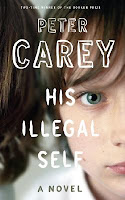what i read in march
 Bird by Bird by Anne Lamott: This is the first book about writing I've ever read--and then only because it was the required text for a class I was teaching. Luckily it's not really about the mechanics of writing, since I believe that those, like the mechanics of car repair, are best learned by trial, error and apprenticeship. Instead Bird by Bird is a warm, comforting and funny book about creating a writing life: about not getting bogged down by the myth that publication will solve all your problems, etc.
Bird by Bird by Anne Lamott: This is the first book about writing I've ever read--and then only because it was the required text for a class I was teaching. Luckily it's not really about the mechanics of writing, since I believe that those, like the mechanics of car repair, are best learned by trial, error and apprenticeship. Instead Bird by Bird is a warm, comforting and funny book about creating a writing life: about not getting bogged down by the myth that publication will solve all your problems, etc. Even though I sometimes had a skeptical dialogue going with Lamott ("You published your first book in your mid-twenties and you pretty much never didn't have an agent"), her point is that writing is a great equalizer: Even privileged geniuses have to wring words from their computers one at a time. And I especially appreciated her discussions of envy and pettiness. If someone as spiritual and smart as Anne Lamott starts thinking mean things about her critics and successful friends, it must be human and okay. This book made me feel human and okay.
The Book of Illusions by Paul Auster: This is a book for book lovers: the story of a grieving academic who pours himself into studying the life and work of Hector Mann, a silent film star who disappeared at the height of his career. But that’s just one of several stories-within-stories, and the novel requires one leap of faith after another that each story will be interesting and relate to the others. Mostly my faith was rewarded. Many of the stories in this book are about (or serve as examples of) toiling in obscurity, whether self- or externally imposed, and it’s hard for any writer not to be moved by the idea that if a book is published in a forest and no one reads it, it still has meaning. Process counts. So even as I found this book slow and sometimes cold and frustratingly meta, I also found it a beautiful shrine to the unknown artist.
Broken Ground by Kai Maristed: When I think about the things I liked and didn't like about this book (the story of a German woman who spends her life crossing familial, national and political borders, with deep personal consequences), I almost feel like I'm sitting in a workshop hearing a critique of my own writing: The language is artful but a little too flourishy; the story is layered and social but the plot meanders until the point where it's wedged into a meh ending; the main character is hard to love. But I should add something no one's ever told me in a critique, unfortunately: Kai Maristed can write a hot sex scene.
His Illegal Self by Peter Carey: This is the third novel I've read in recent years that casts a wary but sympathetic eye on late-sixties radicalism (the others were American Woman by Susan Choi and The Last of Her Kind by Sigrid Nunez), and I've loved each of them. This one is less overtly political, possibly because it's partially told from the point of view of an eight-year-old boy, with gritty, impressionistic descriptions that often required me to reread. It's a kidnapping story that turns into an adoption story, with lots of meandering adventures in the Australian outback in between and a heart-swelling surprise on the very last page.



Comments